Do you work out? How much can you bench? How big are your arms? These have to be the three most common questions ever asked of anybody who weight trains. Simply being asked these questions should show you that your weight-training program is showing positive results. Admit it, we all enjoy the attention we get from our hours of hard work, but why would people be interested in what we can bench press?
Bench pressing is one of those movements that requires more than just great strength in one muscle group. Your arms, shoulders, back, abs, legs and of course your chest muscles all play an active role in determining how much you can bench press. Working exclusively on your chest muscles, hoping to become great at bench-pressing, will lead you to disappointment and injury. The bench press is one of those exercises that can say a lot about your body, simply because it requires so much from your body in order to be successful.
It is no wonder football coaches use the bench press to help determine which position players will end up on. (I have my own story on that particular subject that I will not go into, but suffices to say, I strongly disagree with that method alone of determining positioning.)
Have you ever been to the gym and taken a good look around at the regulars? The gym rats that always seem to be there? Odds are good that their bodies improve very slowly over the years and they probably enjoy the social aspect of the gym more than the training aspect. Look at the other regulars, the guys, (or girls), who come in and blow through their workouts in less than an hour and are gone. These are the guys who are probably showing the greatest physical changes. How? The first group is there for hours training, probably doing more sets and reps that the second group, how is it done? One word. Intensity.
Intensity is the key to successful bench pressing.
Lets get into the heart of the matter by assuming that you, the reader, want to increase how much you can bench press. Where to start? Read my earlier article on Weight Training for Iaido, this will give you the basics of weight training. Successful bench-pressing requires many other muscle groups than just the chest. We are only going to focus on the chest here and now, but your bench press will not increase as much as it should unless your forearms, biceps, triceps, shoulders, abs, back and even your legs are brought up and along with your chest.
Iíve heard too many stories of people exercising two or three muscle groups using one or two exercises and expecting miraculous results. All you are going to get with this type of training is frustration and injury. Train your whole body.
In Weight Training for Iaido I mentioned the old adage; sleep big, eat big, and lift big. These are fundamentally true for all weight-training programs if you want to see results. Expect to gain weight, as you get bigger and stronger. It is commonly accepted that to gain an inch of muscle on your upper arm, (bicep and triceps), your body weight will increase by ten pounds. If you want to get stronger in your bench press, with larger, more dense muscle tissue, expect to gain weight.
Sleep big. You must listen to your body. Learn to understand good pain from bad, and what to do about both. If you are experiencing muscle, tendon, or ligament strains, back off on your workouts. The world will not end if you take a few weeks off of training, better that then doing permanent damage to yourself. You must get a minimum of eight hours sleep a night. School, work and weight training takes a lot out of the human body and we need to rest it in order to recover fully. Muscle growth occurs throughout the day, but most occurs while we sleep. Poor sleep=poor recovery=poor muscle growth.
Eat big. Your body is working hard, feed it lots and lots of good foods. You will need about one and a half to two grams of protein per pound of lean body weight, per day. For example a lean person weighting 150 pounds would need about 225-300 grams of protein a day for muscle growth. Again experiment, you know your body, crank up your protein if you feel that youíre not growing as well as you should. Learn to read your body and what works for it. Carbohydrates should be taken at about 2-3 grams per pound of body weight per day. Experiment, this may seem like a huge amount for some people and a small amount for others. Find out what you need to energize your body and drive it through its workout.
Lift big. Here we go, the whole reason for this article. Make sure you are eating correctly, sleeping enough, and training your whole body before you can expect serious bench press results. Intensity. I mentioned this word before, but what do I mean by it? Think about how hard you are pushing yourself in the gym, are you taking as much rest between sets as possible? Are you chatting it up with others? Are you going through the motions with the weights? Are you doing the exercises that come easy and avoiding the ones that require you to work harder? Do you ever push yourself to find out how much you can really lift? Do you watch the clock?
In order to bench press large amounts of weight you need to push yourself, hard. Once youíve done that, you need to push yourself hard again, then again, and again. Do not take the easy way to anything in the gym. If you are going to be there, if you are going to spend your money on a membership, make it all worth while and strive for something higher than where you are.
Firstly skip all machine exercises. Period. They have their uses but not for serious strength training. Make sure that you have a spotter, someone who will help you when you need help, and let you struggle when you need to struggle. Make sure they understand weight training, donít ask a newbie to spot you when you are trying to max out your bench press!
Train your body completely twice a week. This should give you lots of time to recover.
Bench press: Straight bar. Find out what your maximum lift is for one rep. Generally if you can bench-press 135 pounds for ten reps, 200 in probably your max for one rep. Assume 200 is your benchmark. You will need to do five sets of bench press, (after your warm up!!) All five sets should be to failure. Find out what you can bench for eight reps, five, three, two. For example, based on the 200 pound number above, I would assume eight reps of 150, five reps of 175, three reps of 185 and two sets of two reps of 190/195. My opinion is you should be pushing past your personal best all the time. Donít set a goal of eight weeks down the road, set your goal daily and blow through it. Donít be afraid of challenging your personal best every workout or every week.
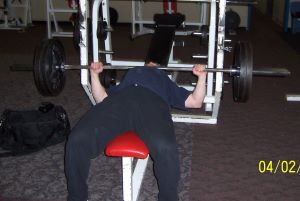
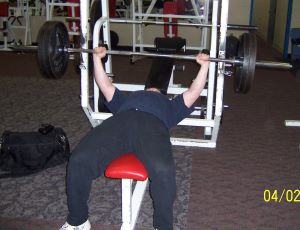
Iíve never set a date for when I will try for my best bench press, it happens all the time. If you walk in one day feeling great push your maximium lift by ten pounds.
The whole trick is do not coast, donít settle for status quo, always push through to your best!
Based on the structure of how to measure weights for the bench press, do the same for:
Incline press, straight bar. This will build up your upper chest and shoulders, all vital for a strong bench press.
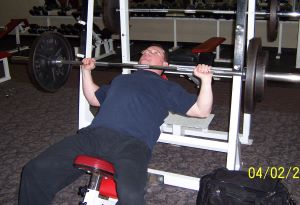
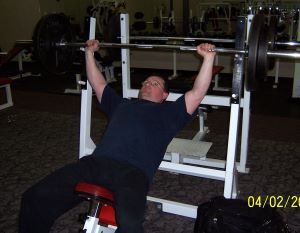
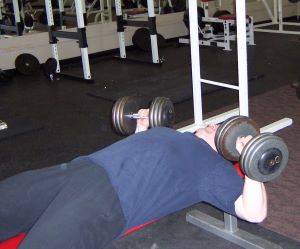
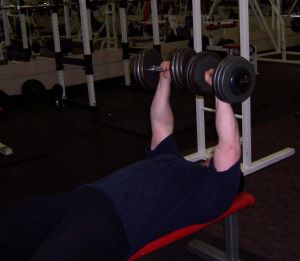
Flat bench incline,
dumb-bells. Similar to incline with a straight bar, but it will hit parts
of the muscles that incline with a straight bar just will not hit properly.
If you are feeling stale and need a break, coast, use machines,
experiment, take an extra day off. If you feel stale for more than a week,
kick yourself in the ass and get back to the intensity needed for results.
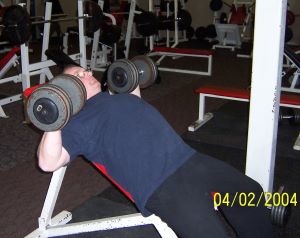
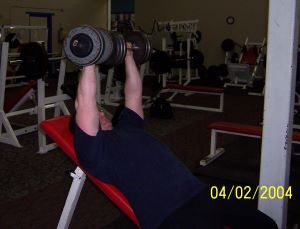
Learn as much as you can about your body, read as much as you can on weight training, experiment with your diet and training, but most of all, if you want to progress in your bench press or any other exercise, you must have serious intensity.